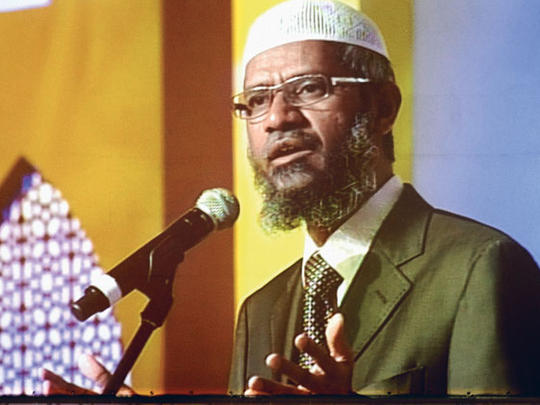
Dubai: Dr Zakir Naik, head of Peace TV, is perhaps one of the most popular Muslim tele-preachers. He draws some of the largest crowds ever in the region and in Dubai. Dr Naik's viewers often witness live instances of people embracing Islam. In spite of his popularity, he has also been criticised for not being a scholar, and for comments he has made on terrorism and Christianity.
Gulf News spoke with Dr Naik to discuss his most recent trip to Dubai.
Gulf news: Up to 25 per cent of the audience in your lectures are non-Muslims. How has your interaction been with non-Muslims?
Dr Zakir Naik: That depends on how the media portrays Islam, which is how the non-Muslim countries regard Islam. Whenever I speak to non-Muslims, I make them feel comfortable that they can criticise and attack Islam, then I ask them first, upfront, what do you think is wrong with Islam?
Then they pose about three or four questions. And in my experience in da'wa [preaching Islam] that I have been in for 15 years, these non-Muslims, when they pose the questions, they invariably fall in the 20 most common questions.
What are the most common questions?
More than 95 per cent of them are repeats. Depending on what the media portrays of Islam, these 20 questions keep on changing, but some will always remain the same.
The number one question is about jihad, which is the most misunderstood concept. Second would be about Muslims as fundamentalists, extremists, and that Islam was spread by the sword.
Do you think your lectures and preaching has more to do with the art of debating and convincing than the subject of your speeches? How important is that?
Of course it's important. Allah asks us to argue and reason with people. Today scientific research tells us that when a person gives a public talk, the matter he speaks of carries only seven per cent [weight]. Ninety-three per cent is presentation skills. How you modulate, your gestures, eye contact. Muslims unfortunately aren't trained like the Christian missionaries. So the art of delivering is very important.
You have been compared to Christian evangelists, who tend to be successful in captivating their audiences. What do you say about that comparison, and have you ever tried to observe and analyse their work?
If you analyse Christianity you will find that the product is zero, but the marketing is 100 per cent. In Islam, the product is 100 but the marketing is zero. If you analyse them, they do a lot of research, but their product [continues to be] zero. We have to improve our marketing skills.
How big has your audience been and how big is your global following?
The largest audience I spoke to was a million people in Kerala, India. In Mumbai, we always have 200-300,000. And outside India I have 10- to 50 thousand.
Last Ramadan, my audience in the UAE was 30,000 people. It was the largest gathering in the UAE. There's no gathering, whether religious or of a pop star, that had even half the audience.
You have been criticised for not being qualified or not being an Islamic scholar. Do you think it's important to convey that to your audience when they ask you questions on religious law?
I never said I was a scholar. People may say that. I don't. As for qualifying, all you need to be [to qualify] is a Muslim. God tells us to propagate even if you know just one word. The thing is I know I haven't gone to a formal religious college. I am by education a medical doctor… but we have almost 25 people in our organisation who are graduates and PhDs from [prestigious Islamic institutions].
How does someone like you make a living?
I'm a medical doctor. I have left my practice but I am a silent partner. In terms of bread and butter it comes from [the practice] and my brother handles it. And Allah has given me a brain.
I have never charged for my lectures and never intend to. We have 400 to 500 paid employees in the organisation. I'm the only one who is not paid. The organisation's income comes from donations.
You regularly refer to Christianity in your lectures. What do you think is the bigger threat to Islam: secularism or Christianity?
The bigger threat is media. It can convert black into white, villain into hero. If you compare Christianity and secularism, of course secularism is [a bigger threat]. But Christians are different from Christianity. Most of the Christians aren't practising; in that way secularism is [a bigger threat].
[Secularists] try to convince us that the life led by the [Prophet] may not be appropriate for this time; that the way of Islamic living, such as hijab, is not right.
Secularism is spreading, but so is Islam.
How big a threat is sectarianism?
God tells us to be strong and not be divided. The Prophet said that there will be 73 sects, but only one will go to heaven. Those that stick to the Quran and Hadith sahih [confirmed sayings of the Prophet] will go to heaven, and the remaining are on the wrong track. The only way we can get back together is through the authentic sources. There's no other way.
When the external threats to Islam disappear, will Muslims turn against each other, as we can see already in some countries?
When you cannot see that external threat, the internal threat [surfaces]. In many parts of the world, where there is no external threat there is an internal one. That's human nature. When they have big enemies they forget about their differences.
There should be reconciliation [between the sects] by going to the authentic sources [but] many people have blind belief.
The sectarian conflict is very significant. Each one has his own group, and each is trying to make his group bigger. It's about power and popularity, whatever you want to call it.
Muslims tend to unite more when there's an external threat. Do you think they need external threats to unite under one banner?
Sometimes it is required. If we are united the external threat will not be powerful. The reason the external threat is significant is because we are not united.
What do you think is the biggest hurdle to Muslim unity? Do Muslims need an external threat to unite? Should preaching Islam only be confined to those who have a formal education in it?












